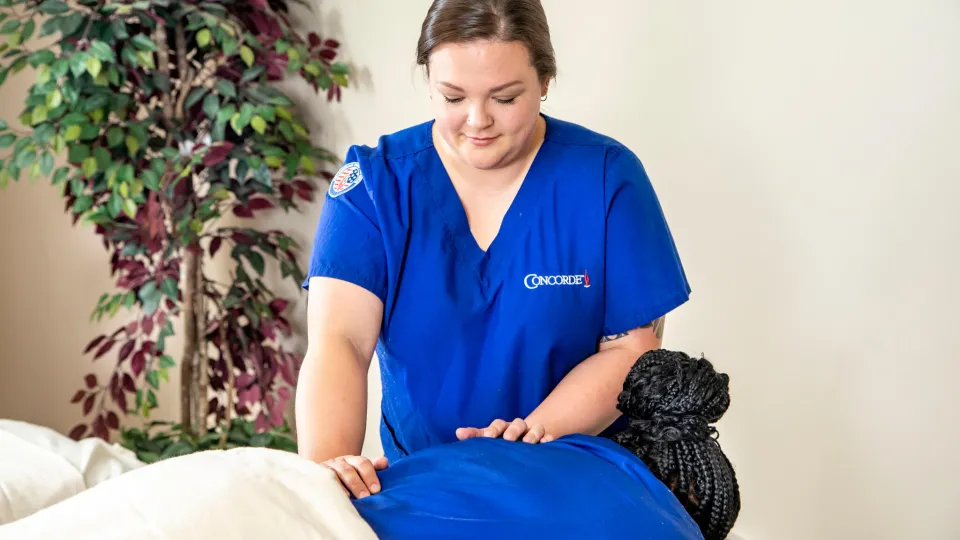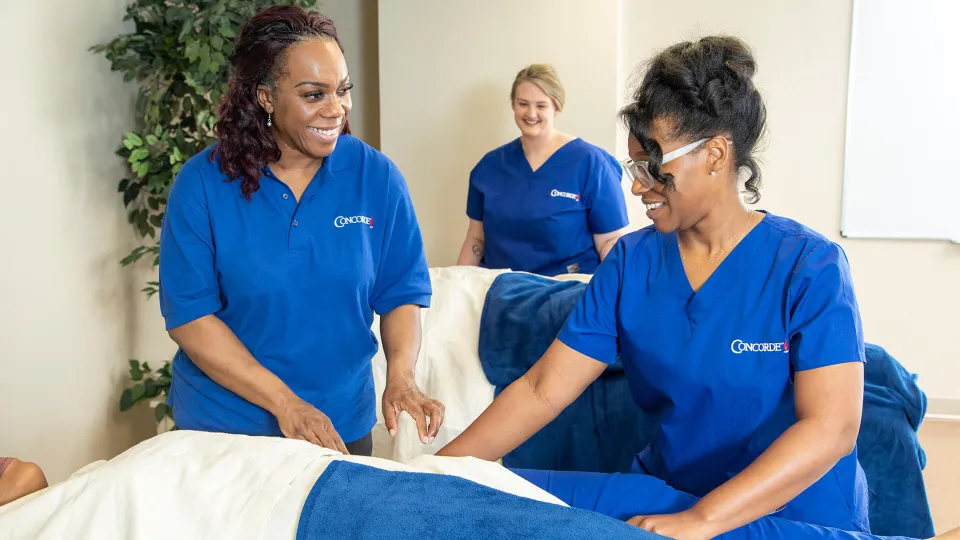
Concorde Career College offers a massage therapy diploma program for students interested in the health and wellness industry. This program trains students to help clients feel their best and improve their quality of life. There are many benefits to training for a career in massage therapy. People interested in holistic health with a desire to help others may thrive in this career. Here are 10 reasons to consider this career path.
1. Work in a high-demand field
The U.S. Bureau of Labor Statistics (1) projects the number of massage therapists to grow by 18% between 2022 and 2032. Professional massage therapists are in demand because of the benefits of massage therapy itself. These benefits include holistic health, an alternative to traditional medical solutions to pain, or the ability to relax. Aspiring massage therapists will be prepared to take the licensure exam, after graduating from the diploma program.
2. Enjoy flexible work hours
Massage therapists may enjoy flexible work hours depending on their employment status. Some therapists work full time and choose the traditional schedule of 9 a.m. to 5 p.m. However, if a therapist works at a clinic, they might choose to work part time or opt to see clients on the weekends. If a massage therapist is self-employed, they have the freedom to schedule appointments around their existing commitments.
3. Experience a low-stress career
The career of a massage therapist has the potential to be low-stress. Typically, the environment where they work is designed to be relaxing for the clients. Massage therapists spend their time in quiet spaces with serene music and soft lighting. The cozy, calm, and quiet environment can contribute to lowering stress levels for massage professionals as well. Additionally, they may have the ability to schedule appointments in a low-stress manner. For example, a therapist may choose to only work with three clients per day instead of booking appointments through all hours of a workday.
4. Find opportunities to help people
People who seek massage therapist services often are experiencing some type of discomfort, whether from stress, an injury, or general pain. Being able to help people improve physically and mentally can provide rewarding experiences for massage therapists who are empathetic and enjoy forming strong relationships with other people or solving their problems. This can help increase their career satisfaction, which may improve their overall quality of life.
5. Accessible training
Massage therapy training is a reasonable option because of the typical length of a program. The massage therapy diploma program at Concorde is 12 months long. The diploma program includes a curriculum that prepares students for the Massage and Bodywork Licensing Examination (MBLEx), which is administered by the Federation of State Massage Therapy Boards (2). Each course in the diploma program is designed to train students to begin their careers.
6. Develop relevant skills
As massage therapists undergo training, they can practice and develop valuable skills to help them earn experience in the field. For example, they may learn about anatomy, physiology, health, and wellness, which they can apply to this career. Additionally, massage therapists interact with clients frequently, which can build important customer service and communication skills. As these professionals use their knowledge of massage therapy, they learn how to build rapport with clients, make people feel comfortable in the environment, and address specific health and wellness needs.
7. Explore growth opportunities
Massage therapists have the option to explore various growth opportunities. After undergoing initial training, some therapists may decide to specialize in a particular type of massage. For example, a therapist may decide to enter the field of sports massage to help athletes recover from injuries. As massage therapists learn the strategies and methods involved in their specialty, they can stand out as experts in their field.
8. Choose between a variety of employment opportunities
The nature of the massage therapy profession provides a variety of employment opportunities (3). Typically, therapists pick the arrangement that works best for them and their existing commitments. Some of these opportunities include:
Employment
Some massage therapists may enjoy full- or part-time employment at a clinic or facility. These environments include hotels, spas, wellness clinics, or private practices. This employment option may offer benefits, a more consistent schedule, and more types of clients.
Contracted
Other massage therapists may work on a contractual basis. For example, a therapist might work for a spa and earn a set amount. However, they can set their schedule. This employment arrangement typically requires the massage therapist to handle their taxes and benefits.
Self-employed
Self-employed massage therapists may have their collection of clients that they visit regularly. When self-employed, therapists can choose their schedules. They might visit clients at their homes to provide services. Self-employed massage therapists can set their rates, as well.
9. Massage therapy clinics
Massage therapists might become entrepreneurs at some point in their careers. This might occur when a therapist decides to open their own private practice. The process of opening a clinic, spa, or wellness center involves time and effort, but the result can provide job security and increased clientele.
10. Experience variety at work
Each workday may be slightly different for massage therapists. If a therapist provides a specialized service, they might work with many types of people each day. If a therapist is self-employed, they might travel to different places each day that they work. Choosing a specialty also diversifies the work of a massage therapist. For example, a therapist in sports massage may provide different services than one who offers Thai massage.
Massage therapy is an opportune option for people who care about helping others and want to pursue a career in health and wellness. Any aspiring massage therapist should consider the diploma program at Concorde Career College, which offers relevant courses in as few as 12 months (4). The opportunity to gain hands-on experience and learn how to apply training prepares students of this program to enter their profession with confidence.
Interested In How To Become a Massage Therapist?
Click here to explore Massage Therapy Programs near you!
Footnotes
1. "Massage Therapists," US Bureau of Labor Statistics, https://www.bls.gov/ooh/healthcare/massage-therapists.htm
2. "Massage and Bodywork Licensing Examination," Federation of State Massage Therapy Boards, https://www.fsmtb.org/mblex/
3. "Employee vs Independent Contractor," American Massage Therapy Association, https://www.amtamassage.org/resources/business-financial-tools/employee-vs-independent-contractor/
4. Program length may be subject to change dependent on transfer credits and course load. Please refer to current course catalog for more information. Concorde does not guarantee admittance, graduation, subsequent employment or salary amount.
Take The Next Step Towards a Brighter Future
Interested in learning more about our Massage Therapy program?
We have a Concorde representative ready to talk about what matters most to you. Get answers about start dates, curriculum, financial aid, scholarships and more!







